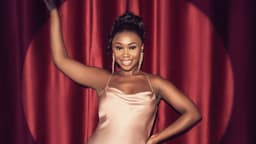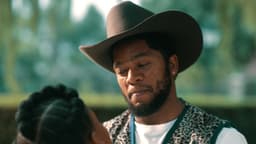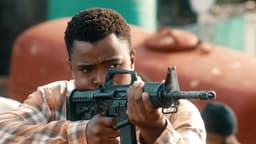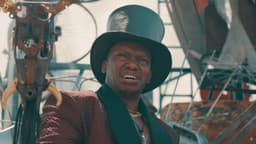
Steven Soderbergh on his HBO Max series Full Circle
Now streaming on Showmax, Full Circle centres on an investigation into a botched kidnapping in New York City.
Inspired by Akira Kurosawa’s 1963 classic, High and Low, the six-part series has an 81% critics’ rating on Rotten Tomatoes, where the critics’ consensus says, “Steven Soderbergh's assured direction and a stacked cast give this simmering noir plenty of intrigue.”
That stacked cat includes Emmy winners Claire Danes (Homeland, Romeo + Juliet), Jharrel Jerome (When They See Us, Moonlight) and Jim Gaffigan (The Jim Gaffigan Show, Peter Pan & Wendy) and Emmy nominees Zazie Beetz (Atlanta, Deadpool 2, Joker) and Timothy Olyphant (The Book of Boba Fett, Fargo, Justified).

As Vulture says in their round-up of the best series of 2023, “In a sea of so much sameness this year… the dense Full Circle, about a kidnapping, a curse, family secrets, corrupt cops, and contemporaneous colonialism, was like absolutely nothing else.”
We caught up with Oscar winner Steven Soderbergh to find out more:
Where did the idea for Full Circle come from?
The initial idea came from an article Ed (Solomon, the writer) read in a New York newspaper 20 years ago, which described a scheme very similar to the one portrayed in the show. People in this group in Queens were taking out policies on transient people without them knowing it, paying the premiums and then they would disappear. Ed was aware I was a fan of the Akira Kurosawa film High and Low (1963), which involves a kidnapping, and he pitched me a version of it. And I thought, that's pretty hooky, so I gave him the go-ahead to start working on it.
How did you approach the story?
The trick is, over the course of six episodes, what information are you releasing at what point and through whom? This one presented some challenges in terms of the information released because you want the audience to be chasing it a little bit but you don't want to frustrate them. We're giving the viewers a lot of credit; we're assuming they pay attention and we challenge them to keep it all orientated. But at the same time, we want to be fair and not play tricks on them and obscure things that should be clear just because we want to be arty. The show really does keep tilting on its axis every two episodes until finally you've inverted the whole idea of who the victim is in this story.
You reshot a number of scenes, including the climactic hospital scenes between Mel (Zazie Beetz) and Sam (Claire Danes). Why?
Ed and I went back and rewrote and reshot it based on all the new ideas that had been implemented over the past couple of months (while shooting). It's a hugely important scene and we have the ability to get it right. I don't understand anybody who doesn't want to go back. To not do so is the equivalent of publishing only first drafts of anything you've ever written. Of course you want to rewrite stuff. I reshot stuff on Sex Lies, and Videotape (1989); I've done it my whole career.

You direct the actors, operate the camera and edit the footage. It's unusual for a director to do all three. Why do you choose to work in that way?
It seems organic to me, it's how I started when I was making short films. In many ways, the first 10-12 years of my career was a process of trying to get back to that - so that the whole experience feels more like when I was making movies with just my friends. Editing is the part of the process I enjoy the most. I'm no Roger Deakins by any stretch of the imagination but it would be really hard for me to insert somebody into this process now that I've been shooting and cutting, myself, for so long. Those are two potentially lengthy conversations with a cinematographer and an editor that I don't have to have. That is why a lot of times people only know or understand what I want to do by literally following me around the set! They know if I stop in a certain place for a certain amount of time the camera is probably going to end up over there, not because I've said anything, but just reading my body language.
Your process is to edit your footage at the end of each shoot day. Why?
I've been doing it since it became technologically possible. It makes me heartsick to think about the first three movies I directed where I didn't start editing until we'd wrapped shooting! It's mind-boggling to think how much better those movies would have been if I'd had the ability to build them as I was going along. It's just a better way to work. Since Out of Sight (1998) we've been able to create a workflow that allows us to cut very close to camera. Che (2008) was when digital cinematography became the norm for me - getting the stuff within an hour after we wrap, that's the dream.
You frequently collaborate with the same actors yet you hadn't worked with many of the Full Circle cast before. Were they on your wishlist?

Whenever I see somebody interesting they go onto a mental post-it board I've constructed. I remember seeing Timothy Olyphant in the movie, Go, in 1999 and thinking, 'That guy is really interesting.' I've tracked him over time. Claire [Danes] has been on my radar since she did her first TV show, My So-Called Life; I don't think there's anyone who doesn't want to work with Claire. CCH Pounder I've been watching for 40 years and I've always loved. I'd seen Jharrel Jerome in everything he'd done prior to this and thought, 'That kid's a movie star.' But some of the other less experienced cast were a real pleasure. They're so bright, talented and together and seem to have a preternatural understanding of the whole thing and how to move their way through it which is really fun and inspiring. Watching them, I'm like, 'I don't feel like I had my shit together when I was their age!' They have great futures ahead of them.
How are you feeling about the show’s release?
I'm always curious. I don't read anything, so it's easy for me to not get too emotionally invested in the result. The process of making it is where I get my kicks. So I'm always prepared for people not to be happy; it's happened before… If my intention is pure, if I went into the whole enterprise with an open heart and did the best I could, it doesn't really matter to me what is said about it. It doesn't rearrange the pixels; the thing is what it is. You obviously want people to like it and to see it but sometimes it takes a while. I've made things that people like more now than when they first came out. A lot of that has to do with their expectation when it first came out. That's the trick here - to set up an expectation for the show that the show meets for people. That often has to do with the marketing materials and there can be a bit of tension sometimes between the materials and the show because you're just trying to get people to watch the show. When Max sent me all the teasers and trailers, I laughed and said, 'It sure looks exciting; I'm afraid it looks too exciting!' We're making a drama with bursts of activity in it - it's not a thriller really, it's a drama - but you've got to get people to watch. So the other argument is, well if they tune in and I lose them, that's on me.
More like this

Jojo on The Real Housewives Ultimate Girls Trip: Africa reunion, social media backlash and more
Jojo opens up about the highly anticipated reunion for The Real Housewives Ultimate Girls Trip: Africa, coming to Showmax on 20 and 27 February.

South Africa’s stories and storytellers recognised as SAFTA nominees announced
Mzansi’s boldest stories take centre stage as the 2026 SAFTA nominees are unveiled, with a wave of nominations across DStv and Showmax.

The ‘Burbs S1
In this adaptation of the 1980s Tom Hanks dark comedy, a couple moves back to the husband's hometown, only to face a cul-de-sac shrouded in mystery.

“You don't create something so powerful purely through military tactics” - Shaka iLembe co-creator
Shaka iLembe co-creator Desireé Markgraaff reflects on the vision, research, and importance of telling our stories. Stream Seasons 1–2 on Showmax.

Where to see the cast of Shaka iLembe S1-2 on Showmax
From Nomzamo Mbatha as Queen Nandi to Lemogang Tsipa as King Shaka Zulu and Thembinkosi Mthembu as King Dingiswayo, see the cast of Shaka iLembe in some of their other acclaimed roles on Showmax. Binge now on Showmax.

MaBlerh to host the first-ever The Real Housewives Ultimate Girls Trip: Africa reunion
MaBlerh will host the first-ever reunion for The Real Housewives Ultimate Girls Trip: Africa, set to air in two parts in February 2026.

Shaka iLembe S1-2
Set in the 1700s, Shaka iLembe tells the story of the making of the iconic African king. All episodes are now available to binge.

Six Taylor Sheridan series while we wait for The Madison
Excited about The Madison coming in April? We’ve rounded up all the Taylor Sheridan series you can watch on Showmax while we wait.
Outlaws, now streaming on Showmax
Go on holiday with RHUGT: Africa
More HBO and HBO Max hits to stream

Jojo on The Real Housewives Ultimate Girls Trip: Africa reunion, social media backlash and more
Jojo opens up about the highly anticipated reunion for The Real Housewives Ultimate Girls Trip: Africa, coming to Showmax on 20 and 27 February.

South Africa’s stories and storytellers recognised as SAFTA nominees announced
Mzansi’s boldest stories take centre stage as the 2026 SAFTA nominees are unveiled, with a wave of nominations across DStv and Showmax.

Billy Joel: And So It Goes (2025)
An honest, insightful, and deeply moving look at the life and career of acclaimed musician Billy Joel, covering both his struggles and triumphs.

Surviving Mormonism with Heather Gay S1
Former RHOSLC cast member Heather Gay investigates hidden truths within the Mormon church, exposing cracks in its perfect facade.
Latest Stories

Schalk Bezuidenhout trades stand-up for 9-5 in Die Kantoor

A heartbreaking loss: Nolwandle Biyela’s final stand in Outlaws Season 2

Fall in love with romantic drama Touch, now on Showmax

Antonie Marx on Volspoed and why it's a must-watch

Sandra Stein makes her debut on Law, Love and Betrayal S2

Albert Pretorius on Die Kantoor, SA’s re-imagining of The Office

20+ addictive South African reality shows to stream

Where to watch The Real Housewives franchise online

How to Train Your Dragon: Bringing Hiccup and Astrid to life

What to watch on Showmax in January 2026

7 things to know about indie award-winning movie Dìdi

Mission: Impossible – The Final Reckoning’s South African stunts

Die Kwiksilwers (2024)

Where to see the cast of Mpondoland on Showmax

Angel on The Real Housewives Ultimate Girls Trip, Jojo and more

Thandolwethu Zondi on his new role in Outlaws S2
Must-watch trailer for Showmax's turbo-charged reality series Volspoed

The Real Housewives Ultimate Girls Trip cast on first impressions, beefs and more

Fana Mokoena on playing a sangoma in Masinga

Princess Jecoco on The Real Housewives Ultimate Girls Trip Africa

Tlali returns: Outlaws’ most loved and hated villain is back

Novocaine: the US box office hit shot in Cape Town

Why Jackie Phamotse says Slay Queens is a must-watch

Evodia on Ultimate Girls Trip Africa and her return to reality TV







